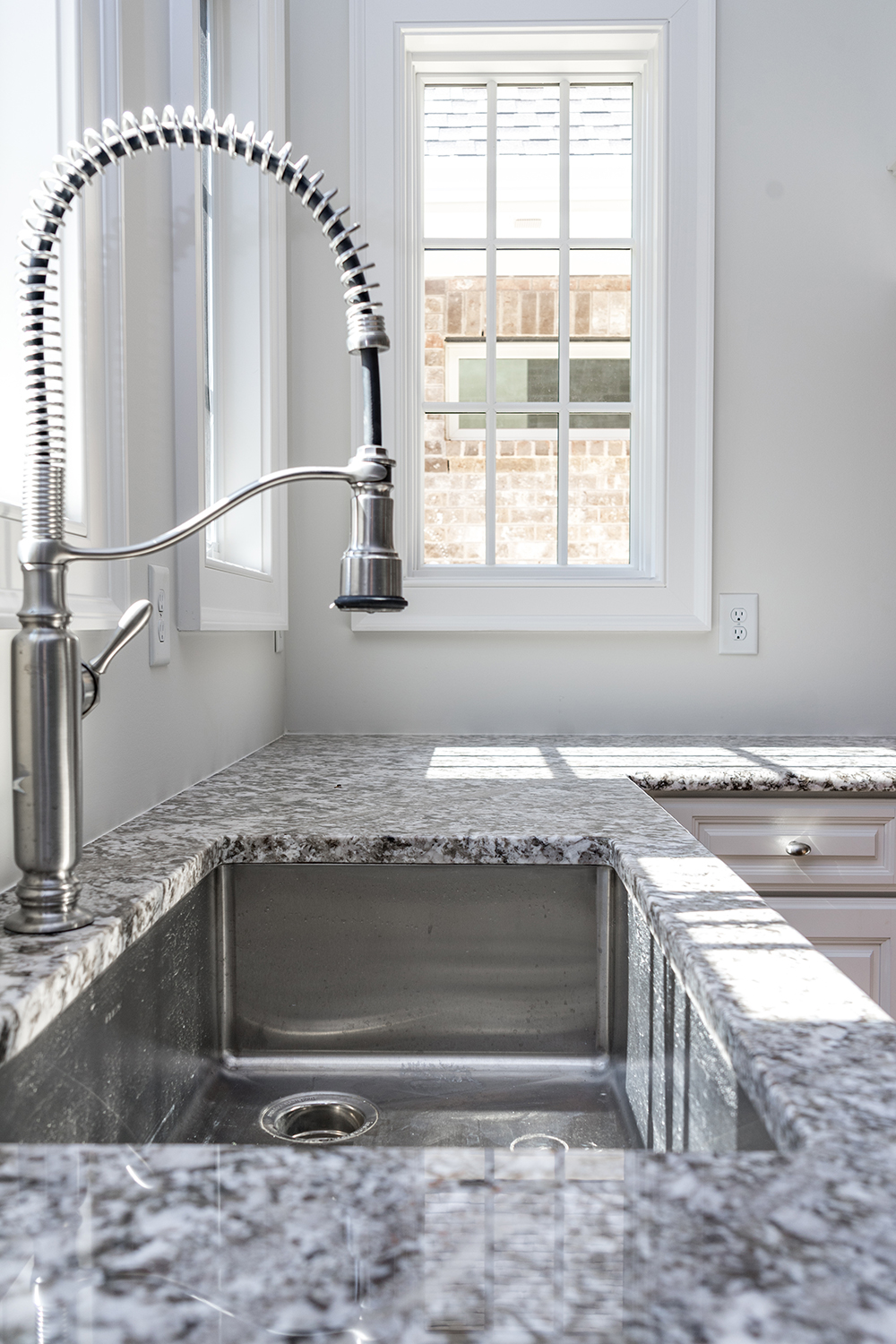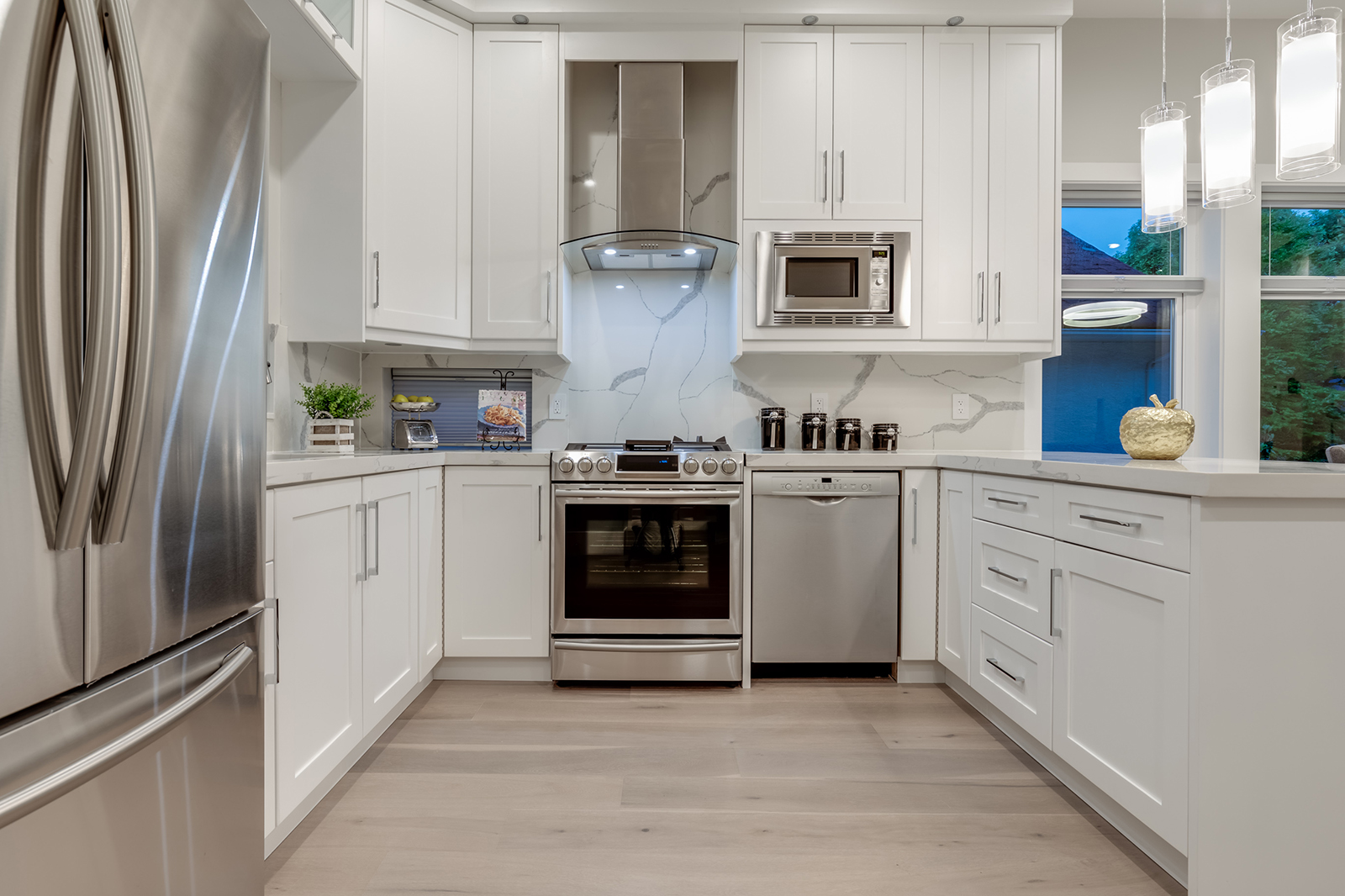
When renovating or building multifamily kitchens, choosing the right multifamily countertop is one of the most important aspects of the design that goes beyond just an aesthetic. Choosing a multifamily countertop is an investment you want to last for years to come; one that will both please tenants and withstand their wear. Think about the practical aspects of different types of countertops. Just like making any type of decision, there are pros and cons for each option. Multifamily Countertops have varying degrees of hardness, durability, heat, and stain resistance. When it comes to the design, would you prefer a natural stone, or would a manufactured composite material fit the bill? While you may have the color and style mapped out in your head, if the material of the countertop doesn’t suit the application, there’s a chance you’ll regret your choice.
Tough Granite
Granite is considered a valuable natural material from the Earth and heavily favored as the perfect choice for multifamily kitchen countertops and islands. Granite countertops have increased in popularity recently. This recent rise in popularity is because granite is one of the most functional building materials in the world. The processing of this material has been revolutionized in the past 20 years with the improvements of diamond cutting tools. Due to granite’s ability to absorb heat and resist scratching and staining, this material is a popular choice among other multifamily and commercial properties. The initial investment varies according to the granite design you choose, but granite countertops are one apartment feature that will certainly result in a positive ROI. Many tenants will seek out units with granite counters and be willing to pay higher rent for them. In addition, the high-quality material should not have to be replaced as often as lower quality, less expensive countertop materials such as plastic laminate. Most granites fall between a 6-7 on the Moh’s scale.
Also Read: Top Trends for Multifamily Interiors
Engineered Quartz
Quartz is a material that is found easily in the Earth. It is a very abundant material. The practice of turning quartz into a surface covering material only came about after recent technological advancements in natural stone cutting and mixing. This artificially crafted countertop is a cheaper alternative to quartzite. Quartz countertops consist of raw quartz and resin. The rise of popularity in quartz countertops are due to their durability and stain resistance. While comparing quartz countertops, there are a vast variety of different colors and designs which are not always available in natural stone countertops. Most common areas of use for quartz are multifamily or mixed-use buildings. Most developers want an inexpensive alternative to other materials, such as quartzite for countertops. Our Catalina collection offers over 30 plus colors designed for your budget and design aesthetic. Depending on color chosen engineered quartz is between a 6-7 on the Moh’s scale.
Quartzite
Quartzite is the wow-factor in multifamily designs. It combines the movement of marble with the durability of granite. Quartzite is siliceous meaning it is more durable than stones primarily composed of calcium carbonate like marble. Quartzite is a 7 on the Moh’s scale. The colors available for multi-family are simply breathtaking.
Compare & Contrast:
Styles may change from season to season, but Mother Nature creates unique designs in natural stone that are historically innovative and always on trend. Therefore, natural stone remains a timeless and flexible option for many interior applications including countertops and flooring. The variety of natural stone available is also beautiful, durable, and versatile, offering endless possibilities for interiors.
Manmade materials often attempt to emulate or replicate these characteristics and qualities. It is essential to understand how natural stone compares to some of the manmade materials used for the same applications to select the most appropriate material. It is also important to know how the material chosen for an interior project will perform under a variety of circumstances, conditions, and uses. At the same time, knowing how the material impacts the environment will ensure that you are choosing the most sustainable material for the application.
A material’s optimal performance is based on a combination of the attributes of the material itself, how the material is installed, and the conditions to which it is exposed. There are many different issues to consider for interior applications:
- How will the material react when it is exposed to heat and elevated temperatures? Some materials will scorch, while others may crack if they are heated too rapidly or unevenly.
- Can the material withstand exposure to chemicals without a visual change or performance degradation? Exposure to acids or alkali, quite common in kitchens, can potentially cause etching.
- How stain-resistant is the material? It is important that the material does not stain easily and that stains can be removed easily. Materials with lower absorption rates tend to be more stain resistant. Using a sealer on more porous materials can lower their absorption rate, helping them to perform better and be more stain resistant.
Performance attributes should be addressed no matter what material you are considering or what type of project you are working on. These factors play an even more important role in sustainability and in the long-term performance of the material. Let’s look at how natural stone compares to some manmade materials from the perspective of these performance objectives.
Multifamily Countertops
The possibilities for countertops using natural stone are quite extensive. Every natural stone slab connects directly to nature as a piece of Earth’s history. These stones are versatile, meaning they can be cut and finished into different shapes and patterns, and with various finishes, creating a cohesive aesthetic. There are typically more options for edging and surface textures available for natural stone than manmade surfaces. Because most stone are formed in nature through extreme heat and pressure, natural stone is inherently heat resistant. Granite and quartzite are also very durable and scratch resistant. In some cases, natural stone may cost more than manmade materials initially—but often, natural stone proves to be the most cost-effective choice due to its durability. This is especially true because natural stone can also be refinished, repaired, restored, or recycled. Stone also has a low embodied energy, an important consideration for sustainability requirements. This is because natural stone was created by the Earth and very little energy or additional resources are needed to quarry, fabricate, and finish it.
Manmade materials including engineered quartz, porcelain, sintered surface, acrylic/solid surface, and cultured marble are also options for interior countertops. These materials typically do not need to be sealed. The patterns and colors of manmade materials are usually consistent within the same dye lot. Acrylic/solid surfaces are repairable, but it is often expensive to do so. Most of these materials do not last as long as stone. Porcelain can be more expensive to purchase and is more expensive to fabricate than natural stone. It is also difficult to repair since the patterns are not full bodied. These materials are typically made in thinner formats which also reduces the edge selection options. This results in the edges not having the same texture and pattern as the surface. The synthetic components of engineered quartz can break down when exposed to UV light. Acrylic, engineered quartz, and cultured marble are not heat or UV resistant. Variation between batches of manufactured materials may cause installation or customer service issues. Most of these materials also have a high embodied energy because they require a wide range of other materials and energy intensive processes to be manufactured.
Learning your multifamily property goals will allow our account management team to educate you on the right countertop choice for your property.



